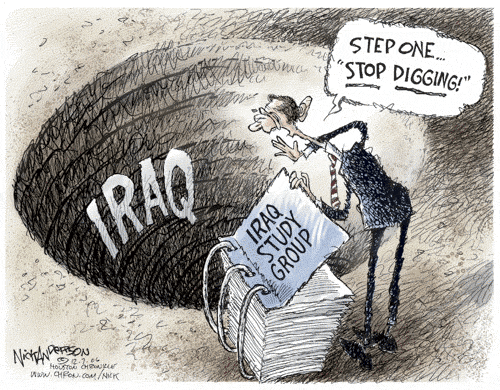Friday, December 22, 2006
NYT: They Told You So

They Told You So
Shortly after U.S. forces marched into Baghdad in 2003, The Weekly Standard published a jeering article titled, “The Cassandra Chronicles: The stupidity of the antiwar doomsayers.” Among those the article mocked was a “war novelist” named James Webb, who is now the senator-elect from Virginia.
The article’s title was more revealing than its authors knew. People forget the nature of Cassandra’s curse: although nobody would believe her, all her prophecies came true.
And so it was with those who warned against invading Iraq. At best, they were ignored. A recent article in The Washington Post ruefully conceded that the paper’s account of the debate in the House of Representatives over the resolution authorizing the Iraq war — a resolution opposed by a majority of the Democrats — gave no coverage at all to those antiwar arguments that now seem prescient.
At worst, those who were skeptical about the case for war had their patriotism and/or their sanity questioned. The New Republic now says that it “deeply regrets its early support for this war.” Does it also deeply regret accusing those who opposed rushing into war of “abject pacifism?”
Now, only a few neocon dead-enders still believe that this war was anything but a vast exercise in folly. And those who braved political pressure and ridicule to oppose what Al Gore has rightly called “the worst strategic mistake in the history of the United States” deserve some credit.
Unlike The Weekly Standard, which singled out those it thought had been proved wrong, I’d like to offer some praise to those who got it right. Here’s a partial honor roll:
Former President George H. W. Bush and Brent Scowcroft, explaining in 1998 why they didn’t go on to Baghdad in 1991: “Had we gone the invasion route, the United States could conceivably still be an occupying power in a bitterly hostile land.”
Representative Ike Skelton, September 2002: “I have no doubt that our military would decisively defeat Iraq’s forces and remove Saddam. But like the proverbial dog chasing the car down the road, we must consider what we would do after we caught it.”
Al Gore, September 2002: “I am deeply concerned that the course of action that we are presently embarking upon with respect to Iraq has the potential to seriously damage our ability to win the war against terrorism and to weaken our ability to lead the world in this new century.”
Barack Obama, now a United States senator, September 2002: “I don’t oppose all wars. What I am opposed to is a dumb war. What I am opposed to is a rash war. What I am opposed to is the cynical attempt by Richard Perle and Paul Wolfowitz and other armchair, weekend warriors in this administration to shove their own ideological agendas down our throats, irrespective of the costs in lives lost and in hardships borne.”
Representative John Spratt, October 2002: “The outcome after the conflict is actually going to be the hardest part, and it is far less certain.”
Representative Nancy Pelosi, now the House speaker-elect, October 2002: “When we go in, the occupation, which is now being called the liberation, could be interminable and the amount of money it costs could be unlimited.”
Senator Russ Feingold, October 2002: “I am increasingly troubled by the seemingly shifting justifications for an invasion at this time. ... When the administration moves back and forth from one argument to another, I think it undercuts the credibility of the case and the belief in its urgency. I believe that this practice of shifting justifications has much to do with the troubling phenomenon of many Americans questioning the administration’s motives.”
Howard Dean, then a candidate for president and now the chairman of the Democratic National Committee, February 2003: “I firmly believe that the president is focusing our diplomats, our military, our intelligence agencies, and even our people on the wrong war, at the wrong time. ... Iraq is a divided country, with Sunni, Shia and Kurdish factions that share both bitter rivalries and access to large quantities of arms.”
We should honor these people for their wisdom and courage. We should also ask why anyone who didn’t raise questions about the war — or, at any rate, anyone who acted as a cheerleader for this march of folly — should be taken seriously when he or she talks about matters of national security.
-----------
To the Editor:
Re “They Told You So” (column, Dec. 8):
Paul Krugman provides an “honor roll” of famous people who warned against invading Iraq. He should also add the average, anonymous Americans like me who spoke out and marched by the hundreds of thousands to try to stave off the disastrous situation we now find ourselves in. Michael Accordino
Bogota, N.J., Dec. 8, 2006
•
To the Editor:
Paul Krugman is right to praise those leaders and thinkers who foretold the disaster in Iraq before the invasion.
The ultimate irony, though, is that today many of these same perspicacious people are the ones being most heavily criticized by pundits for “not having a plan for victory in Iraq,” even though they advised against the invasion in the first place!
There is certainly no easy solution now that we’re deeply involved in an entropic Iraq, so let’s hold accountable the people who put us there in the first place. Jeremy Paley
Washington, Dec. 8, 2006
•
To the Editor:
One group of early skeptics I find missing in Paul Krugman’s “honor roll” are the leaders of “old Europe,” notably President Jacques Chirac of France and Chancellor Gerhard Schröder of Germany.
These leaders very early on forcefully expressed their doubts about the wisdom of invading Iraq, only to have their countries slandered and maligned by the irresponsible hobby warriors who proceeded to cause so much senseless misery.
Johannes M. Heine
Miami, Dec. 8, 2006